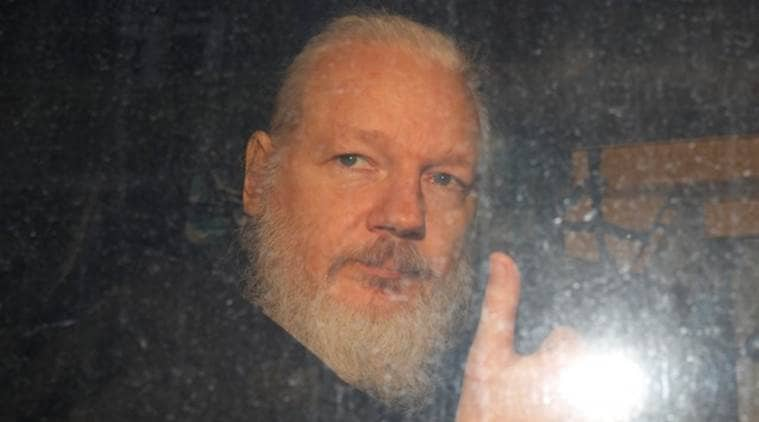
By Mark Mazzetti and Julian E. Barnes
In June 2016, five months before the American presidential election, Julian Assange made a bold prediction during a little-noticed interview with a British television show.
“WikiLeaks has a very big year ahead,” he said, just seconds after announcing that the website he founded would soon be publishing a cache of emails related to Hillary Clinton.
He was right. But an indictment unsealed on Thursday charging Assange with conspiring to hack into a Defense Department computer in 2010 makes no mention of the central role that WikiLeaks played in the Russian campaign to undermine Clinton’s presidential chances and help elect President Donald Trump. It remains unclear whether the arrest of Assange will be a key to unlocking any of the lingering mysteries surrounding the Russians, the Trump campaign and the plot to hack an election.
The Justice Department spent years examining whether Assange was working directly with the Russian government, but legal experts point out that what is known about his activities in 2016 — including publishing stolen emails — is not criminal, and therefore it would be difficult to bring charges against him related to the Russian interference campaign.
Numerous significant questions are left unanswered, including what, if anything, Assange knew about the identity of Guccifer 2.0, a mysterious hacker who U.S. intelligence and law enforcement officials have identified as a front for Russian military intelligence operatives.
Court documents have revealed that it was Russian intelligence — using the Guccifer persona — that provided Assange thousands of emails hacked from the Democratic National Committee and the personal account of John Podesta, the chairman of the Clinton campaign.
Another question is whether Assange was a conduit between the Russian hackers and the Trump campaign. Assange exchanged emails with Donald Trump Jr., the president’s eldest son, during the campaign, and a Trump campaign official dispatched Roger J. Stone Jr., a longtime adviser to the president, to get information about the hacked Democratic emails, according to a January indictment by Robert Mueller, the special counsel.
Mueller concluded his investigation without an indictment that directly connected WikiLeaks, the Russians and the Trump campaign, suggesting that prosecutors did not find sufficient evidence that Assange knowingly engaged in a conspiracy with Russia to help the Trump campaign.
But the report drafted by Mueller’s team, and expected to be released next week, could have additional details about the ties between the Trump campaign and Assange. Those details could be redacted by the Justice Department, however, if officials believe the material includes classified intelligence, said Carrie Cordero, a former official with the Justice Department’s National Security Division and the Office of the Director of National Intelligence.
“What was the actual interaction between Russian intelligence surrogates, WikiLeaks and Trump campaign surrogates?” she said. “That is a question that has not yet been answered.”
On Thursday, congressional Democrats sent a letter to Attorney General William Barr again demanding they be provided the full, unredacted report, along with underlying evidence.
The special counsel also handed off his work to other prosecutors, including those who have long been examining Assange’s dealings with Guccifer, the Russian intelligence front.
Many Democrats and Republicans remain convinced that Assange knowingly worked with Russian intelligence. On Thursday, Sen. Richard Burr, R-N.C., who is chairman of the Senate Intelligence Committee, said Assange and WikiLeaks “have effectively acted as an arm of the Russian intelligence services for years.” The committee’s Democratic vice chairman, Sen. Mark Warner of Virginia, said Assange had become “a direct participant in Russian efforts to undermine the West.”
Assange has long been a polarizing figure — hailed at the beginning of his career as champion for government transparency but also viewed by U.S. national security officials as a disruptive force who conspired with Chelsea Manning, the former Army intelligence analyst, to publish hundreds of thousands of classified documents.
But it was WikiLeaks’ publication of material stolen by Russian intelligence in 2016 that hardened the view of national security officials, even those at the highest reaches of the Trump administration.
In April 2017, in one of his first major speeches, Mike Pompeo — who was CIA director at the time but months earlier, as a Republican congressman, had praised WikiLeaks for its releases that damaged the Clinton campaign — signaled that the government would take a hard line on WikiLeaks.
Pompeo compared WikiLeaks to “a hostile intelligence service,” and said it sought support from anti-democratic countries as it targeted the United States with its disclosures.
Pompeo’s public remarks coincided with a private push against Assange by the Trump administration. The CIA intensified espionage efforts against WikiLeaks, seeking to learn more about his interactions with the Russian intelligence operatives.
The timing of Assange’s actions fueled suspicions. His June 2016 interview announcing the impending release of Democratic emails came three days after a meeting at Trump Tower in New York between Russians and senior Trump campaign officials — a meeting set up on the promise that the Russians would have damaging information about Clinton.
Throughout the 2016 campaign, Assange played down accusations of Russian interference, and misled the public on his source for the damaging documents WikiLeaks released.
He offered a $20,000 reward for information about the killing in Washington of Seth Rich, a young Democratic National Committee staff member shot to death in an apparent bungled street robbery. Some supporters of Trump suggested it was Rich who had leaked the committee’s emails and that he had been killed in retaliation.
During an August 2016 discussion with Dutch television about the sources of WikiLeaks’ information, Assange suddenly brought up Rich’s killing.
“That was just a robbery, I believe, wasn’t it?” the interviewer said. “What are you suggesting?”
“I’m suggesting that our sources take risks,” Assange said. He then declined to say if Rich was a source.